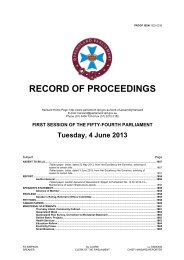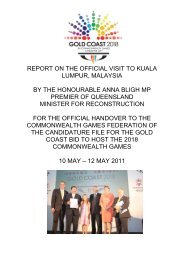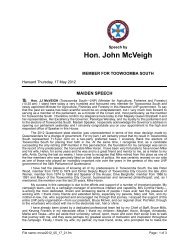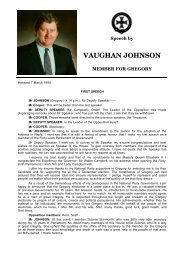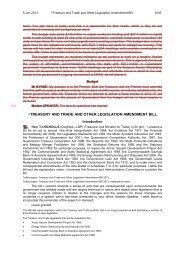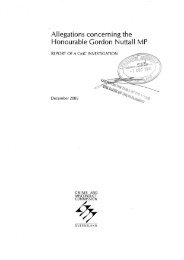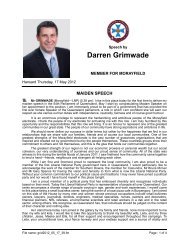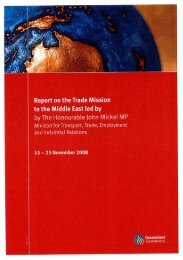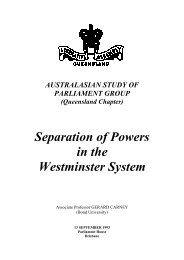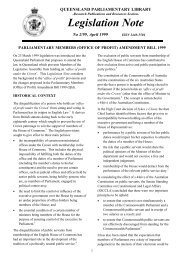weekly hansard - Queensland Parliament - Queensland Government
weekly hansard - Queensland Parliament - Queensland Government
weekly hansard - Queensland Parliament - Queensland Government
Create successful ePaper yourself
Turn your PDF publications into a flip-book with our unique Google optimized e-Paper software.
23 Aug 2005 Plumbing and Drainage and Other Legislation Amendment Bill 2625<br />
I come back to the legislation that we are debating today and this whole question of the use of<br />
recycled water. I do believe that by the time we are looking for another water supply to put into our<br />
system, technology and community attitudes will have changed towards this question of the use of<br />
recycled water. It is very timely that today in the Courier-Mail there is a very interesting article by Dr<br />
Philip Williams, who is a senior lecturer in the School of Environmental Engineering at Griffith University.<br />
The article makes the point very well that there are more opportunities for water recycling, and that is<br />
the reuse of treated waste water, both the grey water we are talking about and black water, which is the<br />
sewage. The article states—<br />
Only a relatively small fraction of our wastewater is recycled now—for golf courses, industry and agriculture. The community is<br />
strongly in favour of these types of uses, presumably because the benefits are obvious and there is no personal contact.<br />
‘Indirect potable reuse’ is another possibility, where treated wastewater effluent would be piped back to the water supply source.<br />
This is well down the list of water recycling priorities and virtually is not practised in Australia—primarily because of adverse public<br />
reaction.<br />
The usual response to proposed schemes or any possible hint that wastewater effluent is linked to drinking water is an immediate<br />
case of the ‘yuk’ factor (faecal aversion, in more scientific terms).<br />
I have certainly encountered that myself. The article continues—<br />
Unfortunately, few people are bothering to think about the issues. Singapore is an overseas exception where a small amount of<br />
treated wastewater is mixed into the water supply lake.<br />
That is something that I have been aware of for some time. I can only commend that particular<br />
approach. I think we will need to consider, both in south-east <strong>Queensland</strong> and across the state, putting<br />
recycled water back into our dams. Then we have all of the processes of water treatment to ensure the<br />
quality of the water we have already put in the dam, which would be very high.<br />
Mr Shine interjected.<br />
Dr LESLEY CLARK: I am glad to hear the member. I take that interjection, because I think that is<br />
the future. It is not some airy-fairy, pie-in-the-sky idea; it is used in other countries. It can be used here.<br />
Just yesterday I was speaking with the minister for natural resources about this very issue. I am<br />
encouraged by his willingness to consider this option and to take the community with us as we discuss<br />
these opportunities. Hopefully, we can get beyond the ‘yuk factor’ which, as I say, we have seen in the<br />
US where these schemes have been scuttled. People have run scare campaigns on ‘toilet to tap’. That<br />
is really a gross exaggeration. It does not reflect at all what can be achieved with this sort of technology.<br />
I believe that, with this legislation and with a raft of other initiatives that this government is<br />
bringing forward, we will move into an era of a much more sustainable use of our water supply. We will<br />
be able to meet the challenges of the droughts that we are experiencing and climate change—all of<br />
those issues that we face in the future.<br />
I encourage all local authorities to continue to work really closely with the government. Again, I<br />
commend the minister for her dual portfolios of Environment and Local <strong>Government</strong>. As she knows, that<br />
places her so well to deal with these issues now and into the future. I look forward to us in Cairns<br />
grappling with these issues in a way that is good for the environment and good for the ratepayers’<br />
bottom line. With those words, I commend the bill to the House.<br />
Ms NOLAN (Ipswich—ALP) (7.43 pm): I rise to speak briefly in support of this bill brought to the<br />
House by the minister for environment. It is long-awaited. I know that the minister has been doing some<br />
good work on this bill for a while now. It is really good to see it culminate, because this minister for<br />
environment made it a priority and made it happen. So I really congratulate her on that.<br />
The bill should be seen in conjunction with the Sustainable Housing Policy which, in terms of<br />
water use, mandates dual-flush toilets and AAA rated shower roses, which have the capacity to save us<br />
about 16,000 litres of water per household per year. The Sustainable Housing Policy also mandates<br />
water pressure limiting devices.<br />
In the period of just a couple of generations our attitudes towards the environment and our use of<br />
resources have changed enormously. This is going to sound very down home, but it is also pertinent. I<br />
talked to my grandma about what it was like when she grew up. My grandma grew up just outside<br />
Warwick. It is hardly the end of the earth. She is now just over 80. When my grandma was a young<br />
woman her family did not have a car, so she would walk or ride a horse to wherever she wanted to go.<br />
Going into Warwick was an enormously big deal. There was no electricity at her home. So the only<br />
refrigeration was by means of an icebox. When my grandma was growing up, once the water tank at<br />
their farmhouse went dry that was it; there was simply no more water. So my grandma grew up—and<br />
this is only two generations ago; it is hardly a particularly long time ago—in an environment where the<br />
maintenance and protection of limited resources were absolutely central to the way in which all people<br />
lived their lives.<br />
In two generations, those attitudes have changed enormously. By the time of my mother’s<br />
generation, we were so resource rich that the waste of resources such as oil, water and paper in the<br />
office became almost a celebration of affluence. I know people who are my mother’s age who really<br />
object to the notion of recycling paper in an office because it is somehow an imposition on those signs of



